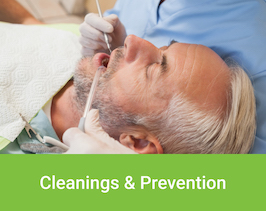Preventive Dental Care for Adults
It is easy to go about our busy lives and procrastinate when it comes to visiting the dentist. With work, family and professional obligations, your dental appointment is at the end of your to-do list. However, preventative dental care is essential for adults. Preventative dental treatments can help you avoid periodontal disease and cavities. It is also important for the early detection of other oral health concerns like oral cancer. Book an appointment with your Cartersville dentist for your routine check-up to help keep your teeth healthy.

What to expect during your dental cleaning
At Today’s Dentistry, your oral health needs come first. Your dental hygienist will take the time to go over any questions you may have regarding your teeth, gums and general oral health concerns. During a typical cleaning procedure, the hygienist will remove plaque and tartar build-up, and thoroughly clean your teeth. X-rays may also be taken if cavities or bite abnormalities are detected, and a fluoride treatment is done at the end of the appointment. Routine cleanings are often the only way to identify and prevent diseases before they manifest. Your dentist and hygienist are trained to look for signs of oral cancer, periodontal disease, and more serious health problems during your cleaning appointment. Your appointment will include:
- Cleaning & polishing the teeth
- In-depth oral examination
- X-rays
- Flouride treatment
- How to brush and floss
- How to prevent periodontal disease
What is periodontal disease?
Periodontal disease is the medical term for severe gum disease. It refers to an infection of the soft tissues in your mouth. Periodontal disease is most often caused by a lack of oral hygiene, specifically poor brushing and flossing. In its early stages, periodontal disease appears as gum disease, gingivitis, or both. As it progresses, it can be irreversible and lead to tooth loss, root canals and severe infection. It is easy to treat when it is detected early. The best way to prevent periodontal disease is by visiting your dentist for your regular oral checkups and cleanings.
Common signs of periodontal disease
Periodontal disease, also known as periodontitis, can manifest in many ways. There are common signs and symptoms of periodontal disease that you should be aware of. If you are concerned about your dental health, or you have not visited the dentist in the past 6 months and you experience these symptoms, visit your dentist for an examination.
- Inflamed, tender gums
- Bad breath
- Gums that bleed or are painful
- Loose teeth
- Sensitive teeth
- Difficulty biting or chewing
During your appointment, your dentist will examine your mouth and look for these telltale signs of periodontal disease.
Treating periodontal disease
Depending on how far the disease has progressed, there are several different treatment options available to patients with periodontal disease.
- Deep Cleaning – If periodontal disease is detected in its early stages, a simple deep cleaning of the teeth may be enough to resolve the problem. Deep cleanings are like a very thorough version of your routine dental cleaning. Your hygienist will clean deep into the pockets of plaque and bacteria under the gums and on the roots of your teeth in a procedure called scaling and root planing.
- Gum Grafting – If the gums are at the point where they are receding due to infection, gum grafting may be required. Bone grafting can also be done for patients who experience a loss of jaw bone tissue. Antibiotics may be used in conjunction with gum grafting to ensure the infection is gone.
- Deep Pocket Removal – This is a gum surgery that generally only requires local anesthetic and numbing. Your dentist performs a surgery to remove deep pockets of plaque within your gums and along the roots of your teeth.
- Dental Crowns and Implants – If periodontal disease has progressed to the point of tooth loss, your dentist can still place dental implants and crowns to fill the spaces where your teeth once were. You may also require dental bridges, depending on the number of teeth lost. Implants can only be placed once the infection has fully been treated and the gums have healed.
Protect your tooth and jawbone integrity. Call us at (770) 387-0750 or request an appointment online with Dr. Slocum.
